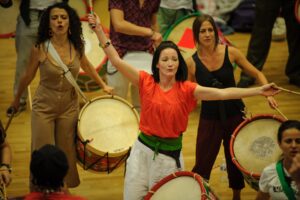Our chief executive Ruth Hollis lays out a roadmap where the Power of Events Inquiry will underpin our final three years.

'What next' for Spirit of 2012 after major events inquiry

This week, we published the final report from our independent Inquiry into the Power of Events. We’d like to thank Sir Tom Hughes-Hallett and the 25-strong panel for their contribution to the Inquiry
We have always endeavoured to be an organisation driven by curiosity so it’s been a real joy to have the space to explore how the learning we’ve gathered over almost a decade of grant making in and around UK events, sits alongside the research and insights of others – and be challenged on how we can collectively make events more impactful over the longer term.
We know how powerful events can be for individuals and communities – we saw brilliant examples of event delivery last year and are looking forward to the Coronation, Eurovision, and Windrush and NHS anniversaries later this year.
The report asks us to constantly keep thinking about ‘what next’, and that’s a question for all event commissioners, funders and hosts
The Inquiry recommendations are more than just words on paper, they are an engine of change. From the outset, they will drive Spirit of 2012’s strategy for the next (and final) three years.

So what will we be doing differently, to make sure that these recommendations have the best possible chance of being taken on board?
Firstly we want to work with event organisers, policymakers and other funders to make these recommendations a reality, to ensure that we make the most of the opportunities that events bring in the future. We will be holding a series of roundtables to explore this further and reaching out to event organisers and commissioners directly.
Secondly we will continue to use our existing grant making and remaining funds to gather best practice and learning which will help others do this.
We’re currently reviewing applications for our Moments to Connect fund, which looks at how the events of 2023 like the Coronation, Eurovision and the Windrush anniversary can bridge divides. We will continue our work to support events to be as inclusive as they can be, building on Birmingham 2022’s Critical Mass project as well as our wider grant funding.
And we will do more to share lessons from current grants such as HEY! Volunteering and the Volunteering Cities fund to make sure event volunteer programmes go on to strengthen existing volunteer infrastructure.
Thirdly we are keen to explore the Inquiry’s specific proposals – for a data observatory and City of Sport – more fully. Curiosity about what works, and what doesn’t, and how we find out has been at the heart of our grant funding over the last decade, so the concept of a data observatory completely resonated with us, and we are keen to continue conversations with those interested in making it happen.
And we will be kickstarting a formal feasibility study into City of Sport – which our Board last we agreed to commit £50,000 funding for − and are looking for people to take part. Please do get in touch with Gaetano.iannetta@spiritof2012.org.uk if you’re interested in this element of the work.
One of the things that struck us most throughout this process are the deep opportunities for shared learning – that sport and culture, academics and organisers, community events and mega events sometimes seem to be talking a different language, but that events can provide a bridge to have rich conversations across these boundaries.
We know that events can be powerful, even transformative for individuals and communities. But we also know we can be doing more to maximise those impacts over the long term. Join us to carrying on exploring how we do can do this together.
Further information
More on the Inquiry into the Power of Events
Download the full Inquiry report
National Inquiry calls for legacy to be put at the heart of events
